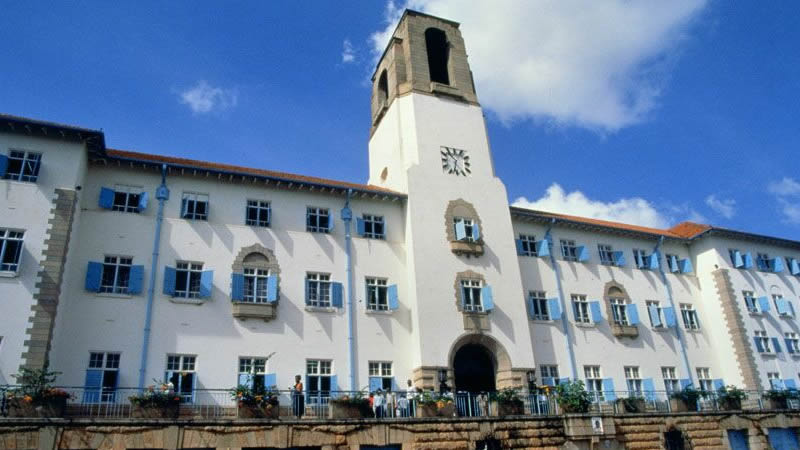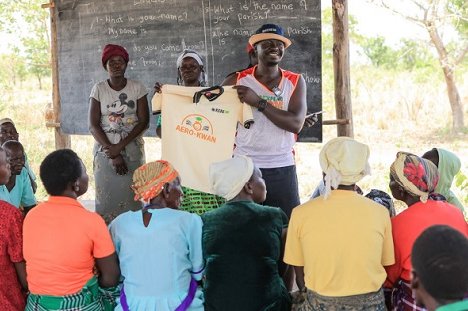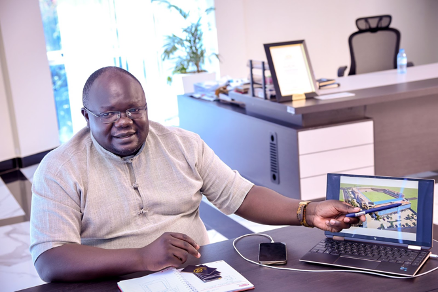By Mark Wamai
For Ojok Okello, a rural futurist building Africa’s model village, it was a term he first encountered when, as an Ordinary Level student in Lira District in northern Uganda, he became fascinated by the handouts and notes his aunt often brought home to read during her school breaks. She was a student of Development Economics.
“Having lived up north during the [Lord’s Resistance Army - LRA] war and becoming a victim myself, I had very many questions and very few answers. And so, in my academic pursuit, I thought I should find some answers,” Okello says.
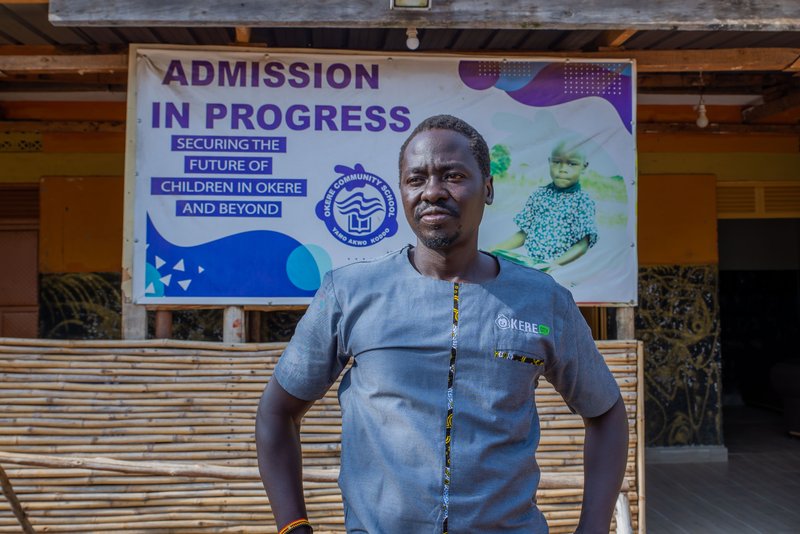
Founder and CEO of Okere City, Ojok Okello stands outside one of the community's classroom blocks built out of locally available materials.
When the time came to fill out the Public Universities Joint Admissions Board (PUJAB) forms, he entered only two academic programmes: Development Studies as his first choice and Development Economics – a bold move, given the competitive nature of government-sponsored programs.
“When I had the option of choosing courses from the other universities, I didn’t, because in my mind, only one university really existed in Uganda, and that was Makerere. Growing up, we had nursery rhymes about working hard and coming to Makerere, so that stuck in my mind,” he explains.
Okello sat for the Advanced Level examinations at Comboni College in Lira and emerged among the best students. Thanks to this prolific performance he joined Makerere University in 2007 on government sponsorship under the district quota scheme to pursue his dream programme, Bachelor of Development Studies.
Life as a student at Makerere can be daunting for many, but for Okello, it was one of the most exciting times of his life. Having previously lived in Northern Uganda, not only did he have the opportunity to break out of his shell, he also immersed himself in the diverse cultures of students from all over Uganda and East Africa.
So profound was his experience that on his first day in class, before the 150 students had even learnt each other’s names, Okello was unanimously chosen to be the class coordinator, a position he held for the next three years.
“I dressed up so impeccably; I had an old-school suit with a necktie, never mind that I don’t wear neckties and suits these days,” he says. “Before the first lecturer could teach, he said we needed a course coordinator, and since I sat at the front, all the students just pointed at me.”
The same scenario played out in his second year when he was unanimously chosen, not elected, to become the president of the Makerere University Development Studies Students Association (MUDESA).
“This leadership role became so relevant because I also got closely involved with industry players, inviting professionals to speak to the students and organizing career development sessions,” Okello recalls.
His advice to university students and alumni is to always stand out. “If you are a student, you are at your prime. You stand out by being exceptional, humble, knowledgeable, lovely and passionate,” he says.
In this same spirit of being humble and helpful, he moved from University Hall where he had been allocated upon admission, to Mitchell Hall to help his friend, Tony, who used a wheelchair. “In addition to being a student, I was also his helper, pushing him around campus," Okello says, adding that they are still good friends.
It was not all academics and leadership for Okello while at Makerere. He describes himself as being “quite entrepreneurial” as a student. Having stayed in Mitchell Hall during his first and second years, he moved off-campus to a residence in nearby Kikoni in his third year and noticed a business opportunity.
“We struggled to get snacks, so I opened a canteen and became the major supplier of groundnuts, especially to CCE Hall canteens. I was quite busy as a student entrepreneur,” he says.
Professionally, Okello started off by working for the Centre for Social Research, a small consultancy firm started by professors at the Makerere Institute of Social Research (MISR), thanks to connections he had made during his second year internship and his various leadership roles. Thereafter, he joined Volunteer Efforts for Development Concerns (VEDCO), a non-governmental organization in Pader District, as a monitoring and evaluation officer. Here, he worked with farmers returning to their homes from Internally Displaced Peoples (IDP) camps where the LRA war had forced them to flee. During this time, he enrolled for the Master of Arts in Rural Development at Makerere, which grounded his understanding of rural life and rural sociology.
Okello later joined War Child UK, another NGO in Pader, as a business development officer. It was while in this position that he wrote the proposal that won funding worth £200,000 to help reintegrate former LRA child soldiers in the community. Greatly buoyed, he was assigned the role of program manager and oversaw his project for two years.
As fate would have it, while working with War Child UK, he came across the Program for African Leadership founded by Firoz Lalji, a Ugandan-Indian who grants scholarship opportunities to students from Uganda. He applied for the competitive programme and secured a scholarship to pursue a Master’s degree in Development Management at the prestigious London School of Economics and Political Science (LSE) in the UK.
“That really gave me a very vivid understanding of development beyond Uganda and strengthened my theoretical understanding of how development work could be done,” he says.
Upon return from the UK, he joined the Konrad Adenauer Stiftung (KAS) as a program manager where he coordinated special projects such as the Uganda Social Media and Kampala Geopolitics conferences before moving to Makerere University as a senior assistant secretary.
“While at KAS in 2019, I had started this community-based organisation in my village [Okere]. While I was working at KAS and Makerere University, it became so clear to me that if I wanted to make any mark in the world, it would be with the rural people – the people who are really on the margins and who need a big boost,” he recalls.
In 2021, he decided to devote all of his time and the knowledge and skills he had acquired over the years to his community and to support it to emerge as one of the most progressive villages in Africa. As a rural futurist, Okello describes himself as one who spends a lot of his time “thinking, writing and doing to make sure that we make our African villages more livable, happier, more peaceful and more prosperous.”
It was with this passion that he founded and serves as chief executive of the Okere Community Development Project, also known as “Okere City”, a community-based initiative and social enterprise in Otuke District in northern Uganda.
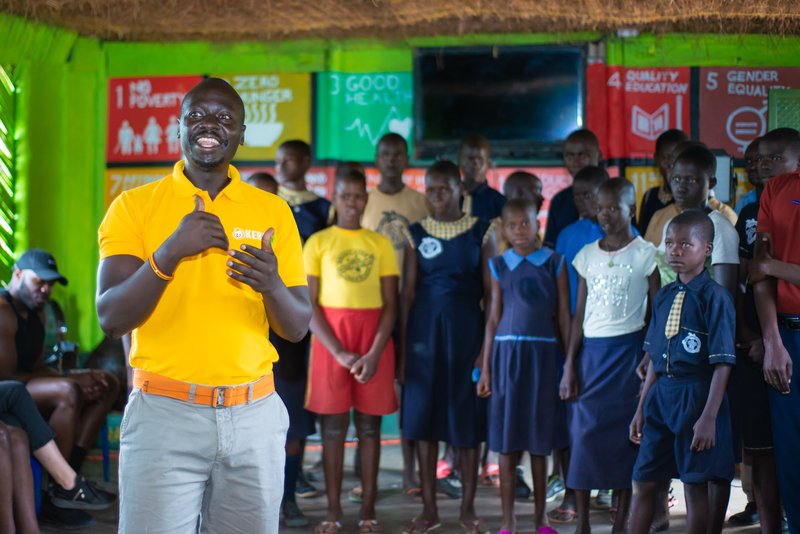
Ojok Okello addresses participants during the Okere City SDG Summit in May 2022 with pupils from the community school in the background.
“We build community projects spanning across education, health and agriculture. We work with rural community members – up to 10,000 of them – and together, we are on a journey to build a thriving village,” Okello says. “I think our work has over the past four years been nothing short of that. We’ve been documented on CNN, we’ve featured in The Guardian, and we’ve been interviewed by the BBC, and all the media houses in Uganda have picked interest in our stories. The sky is just the limit!” he adds with a chuckle.
In terms of daily impact, Okere City accords educational opportunities to 500 children, medical care to 50 community members, employs up to 50 people, and runs a supermarket, computer training facility, various social services and cultural products accessed by up to 150 community members. Additionally, Okere City’s shea butter cooperative society made a net profit of US$10,000 last year.
The above impact notwithstanding, Okello is careful to add that the impact of a community development project ought not to be measured in numbers.
“The impact of our work can only be measured in years or even decades to come when our children get the requisite education that they need and become significant pillars that hold not only our community, but our country at large together,” he says.
Okere City’s uniqueness is in building infrastructure using locally available materials such as bamboo, grass and mud. “What we try to do is build projects and infrastructure that inspire ordinary community members to reimagine what they could do or do even better. We want to pilot an experimental rural development program that can inspire other villages across the African continent,” he says.
Okello hopes that various governments and multi-national development organizations that are still experimenting with models on how to facilitate rural transformation would find the Okere City model worth replicating. “That would be our biggest offer and contribution to everyone else who cares about rural development in Africa,” he says.
Okello considers himself privileged and lucky to have had the opportunity to study on a program at Makerere that shaped his worldview and informed the work in which he is passionately engaged.
“As a student, I really learnt quintessential leadership skills that enable me to lead the organization that I run and the community that I work with,” he says.
He credits the vast collection of resources in the Makerere University Library for equipping him with the knowledge and skills one needs to thrive, and for helping him develop a strong reading culture and thirst for knowledge. “In a nutshell, the love for reading and the ability to dig deeper and comprehend issues are some of the things that make Makerere so dear to me.”
In an era where research and knowledge production through collaboration and co-creation are increasingly becoming significant, Okello opines that his Alma Mater ought to foster more community-led initiatives or be part of those where researchers engage more with communities.
“Whatever projects or ideas emerge thereof are not just theoretical, but are informed by the actual problems and realities of the people on the ground and therefore relevant to their development,” he says.
He believes that Makerere has the potential to be well endowed, which hinges on being more appealing to the alumni network.
“Makerere must reimagine how it engages with the alumni, and that starts with how the university treats its students. I only want to give back to something that I think shaped my worldview and contributed to my success. Mobilizing financial resources, especially for a university of Makerere’s stature, should be the easiest thing to do,” Okello says.
He also urges the alumni to reach for the low-hanging fruits by volunteering to either provide career guidance or technical expert lectures to the students at Makerere.
“We must all be grateful to this mammoth of a university that shaped us and enabled us to be the people we are in society today. If there is anything that we can do to give back to strengthen it so that it is continuously enabled to build for the future, we ought to.”
Related News
![]() Please join hands with the Makerere University Endowment Fund as it works towards attracting & retaining the best faculty, providing scholarships, and investing in cutting-edge research and technology.
Please join hands with the Makerere University Endowment Fund as it works towards attracting & retaining the best faculty, providing scholarships, and investing in cutting-edge research and technology.
